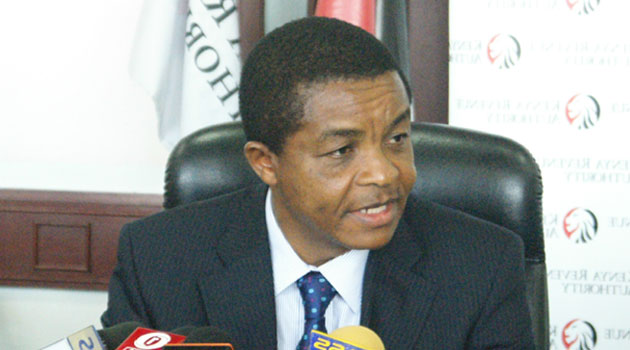
Kenya Revenue Authority (KRA) Commissioner General John Njiraini says the bonds scheme is designed to fast-track movement of goods under customs seals in the East Africa region/FILE
Kenya Revenue Authority (KRA) Commissioner General John Njiraini says the bonds scheme is designed to fast-track movement of goods under customs seals in the East Africa region.
Value of customs bonds vary from country to country because of different duty rates and valuation of goods.
In Kenya, the current procedure requires importers of transit goods to secure a customs bond issued by an insurance company, whilst ‘sensitive’ cargo such as clothes, wines and spirits, tyres and tubes, shoes, electronic goods, second-hand clothes, food commodities (sugar and rice) require a bank or cash guarantee.
The customs bond in Uganda is issued by an insurance company and is cancelled upon presentation of a copy CD-COM duly stamped by customs officers of the post of exit. Rwanda also requires a bond in cash.
“The adoption of common external tariffs and the introduction of a regional bond guarantee scheme should solve this problem,” said Njiraini during a regional meeting in Nairobi that discussed the implementation of the EAC Single Customs Territory (SCT) projects.
The meeting comes ahead of the forthcoming 11th Northern Corridor Integration Projects Summit, to be held in Nairobi.
The one day meeting brought together the Commissioners General of Revenue Authorities from Kenya, Uganda, Rwanda, Tanzania, Burundi and Democratic Republic of Congo to discuss cargo clearance time and costs.
The commissioners discussed the implementation of the Warehousing Regime and Reintroduction of Export Declaration by Kenya.
“The revenue authorities met to discuss the implementation of the East Africa Community, Single Customs Territory projects that will ensure faster clearance of goods at the first point of entry within East Africa and cut time and resources used by various governments to collect customs tax at various borders,” said Njiraini.
The SCT will ensure that assessment and collection of taxes for goods destined for countries in East Africa is done at the port of entry.
A fully functional customs territory would make it easier to clear goods and reduce protectionist tendencies. This is directly geared towards enhancing the ease of doing business in the region.
At the moment, many one stop boarder stations are being constructed at Mirama Hills – border with Rwanda and Mutukula – border with Tanzania; all aimed at providing fast clearance of goods since all officials concerned with clearance will sit under one roof.
The implementation of the SCT is being handled in three phases. In phase one, it addresses bulk cargo such as fuel, wheat grain and clinker used in cement manufacturing.
Phase two handles containerized cargo and motor vehicles while the third phase would handle Intra-regional trade among countries implementing the SCT Tripartite arrangement.
The treaty for the establishment of the East African Community provides that a Customs Union shall be the first stage in the process of economic integration.
The actualization of economic integration in the region in essence will commence with the coming into being of the Customs Union.
Njiraini further said that the creation of SCT will enable partner states to enjoy economies of scale, with a view to supporting the process of economic development.
“The EAC Customs Union will create a level playing field for the region’s producers by imposing uniform competition policy and law, customs procedures and external tariffs on goods imported from third countries, which should assist the region to advance its economic development and poverty reduction agenda,” said Njiraini.


































